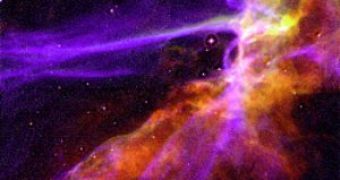The quickening pace of our universe's expansion may be driven by a mysterious force called dark energy.
Astronomers were astonished to discover in 1998 that the expansion of the universe is happening at an ever-increasing rate. The mysterious repulsive force responsible for this was dubbed dark energy, though scientists still do not know what it is, and it's causing some physicists to do their science backwards.
Christian Beck of Queen Mary, University of London and his colleague Michael Mackey of McGill University in Montreal, Canada, proposed a table-top experiment to detect the elusive form of energy, without quite knowing why it might work. This was to test the theory that the quantum fluctuations of empty space could be the source of dark energy.
Now the duo say they know, and last week, Beck presented the theory at a conference on unsolved problems for the standard model of cosmology held at Imperial College London.
Quantum mechanics says that the vacuum of space is seething with virtual photons that are popping in and out of existence. Beck and Mackey suggest that when these virtual photons have a frequency below a certain threshold, they are able to interact gravitationally, contributing to dark energy.
Some evidence that dark energy works like this may already have been found.
In 2006, Martin Tajmar at the Austrian Research Centers facility in Seibersdorf and his colleagues noticed bizarre behavior in a spinning niobium ring. At room temperature, niobium does not superconduct and accelerometers around the ring measured that it was spinning at a constant rate. But once the temperature fell, the niobium started to superconduct and the accelerometers suddenly picked up a signal.
The controversial experiment of Beck and Mackey seemed to clash with Einstein's equivalence principle which states that all objects should accelerate under gravity at the same rate, and the odd acceleration detected in the niobium ring also suggests that energy isn't conserved in the superconductor - another major violation of known physics.
"We did the sums and found out that energy wasn't conserved, but perhaps that was just because we were missing dark energy," says Clovis de Matos, who works at the European Space Agency in Paris.
If and when dark energy will be proven, it could mean a new way of thinking a number of quantum general relativity laws, and hopefully will let us know more about the birth and the future of the Universe.

 14 DAY TRIAL //
14 DAY TRIAL //